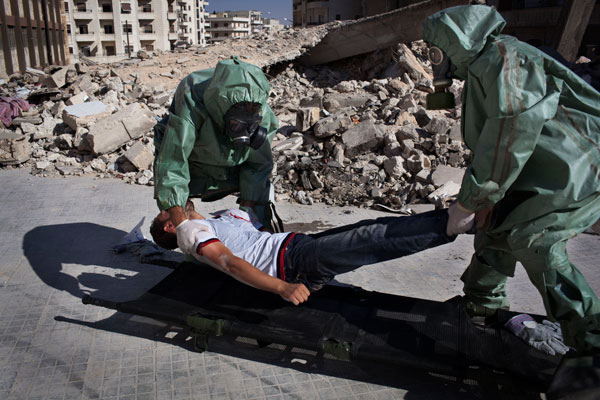UN confirms nerve gas used in Syria
 |
|
Volunteers take part in a simulation of how to respond to a chemical attack, in the northern Syrian city of Aleppo on Sunday. JM Lopez / Agence France-Presse |
A photograph of chief UN chemical weapons investigator Ake Sellstrom handing over his report on an Aug 21 gas attack on Damascus suburbs shows that the report confirms use of the deadly nerve agent sarin.
"On the basis of the evidence obtained during the investigation of the Ghouta incident, the conclusion is that chemical weapons have been used in the ongoing conflict between the parties in the Syrian Arab Republic ... against civilians, including children, on a relatively large scale," the report said.
"In particular the environmental, chemical and medical samples we have collected provide clear and convincing evidence that surface to surface rockets containing the nerve agent sarin were used," it said.
The photo released by the United Nations shows Sellstrom giving the report, which was scheduled to be officially released later on Monday, to UN Secretary-General Ban Ki-moon.
Britain, France and the United States agreed on Monday on the need for a "strong and binding" UN resolution on the transfer of Syria's chemical weapons to international control.
Kick-starting a week of intense diplomatic activity after a weekend US-Russia deal on the dismantling of Syria's deadly arsenal, French President Francois Hollande met with US Secretary of State John Kerry and British Foreign Minister William Hague.
Hollande aides said the three countries were united in their determination to ensure Syrian President Bashar al-Assad complies fully and swiftly with Saturday's Geneva accord.
"They agreed that the resolution must be strong, robust and set a precise timetable," a spokesman said.
Russian Foreign Minister Sergei Lavrov said on Monday that it may be time to consider efforts to force - instead of merely urge - Assad foes to attend an international peace conference.
Lavrov accused European countries of trying to reinterpret the agreement he reached with Kerry.
Lavrov and Kerry announced in May that their nations would seek to bring representatives of the Syrian government and opposition together at an international conference, but no date has been set and Moscow says rebel recalcitrance is the main hurdle.
"It is necessary to first convince the opposition (to attend). But maybe it's time to start using a different verb - to force the opposition to take part in the conference," Lavrov said after talks with Egyptian Foreign Minister Nabil Fahmy.
Lavrov took issue with what he said were calls from Europe for swift passage of a Security Council resolution under Chapter VII of the UN Charter, which can include the use of force, saying they showed a "lack of understanding" of the US-Russian agreement on chemical arms.
AFP-Reuters-AP





















